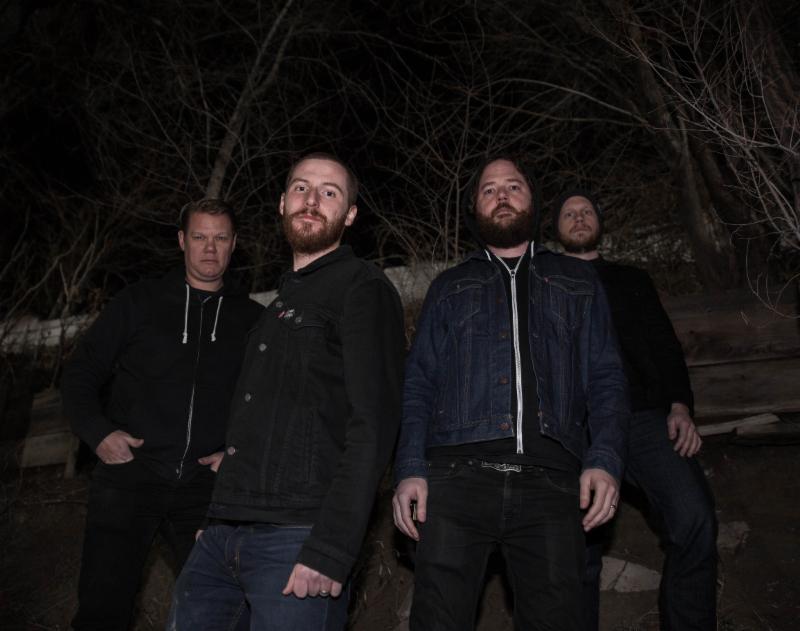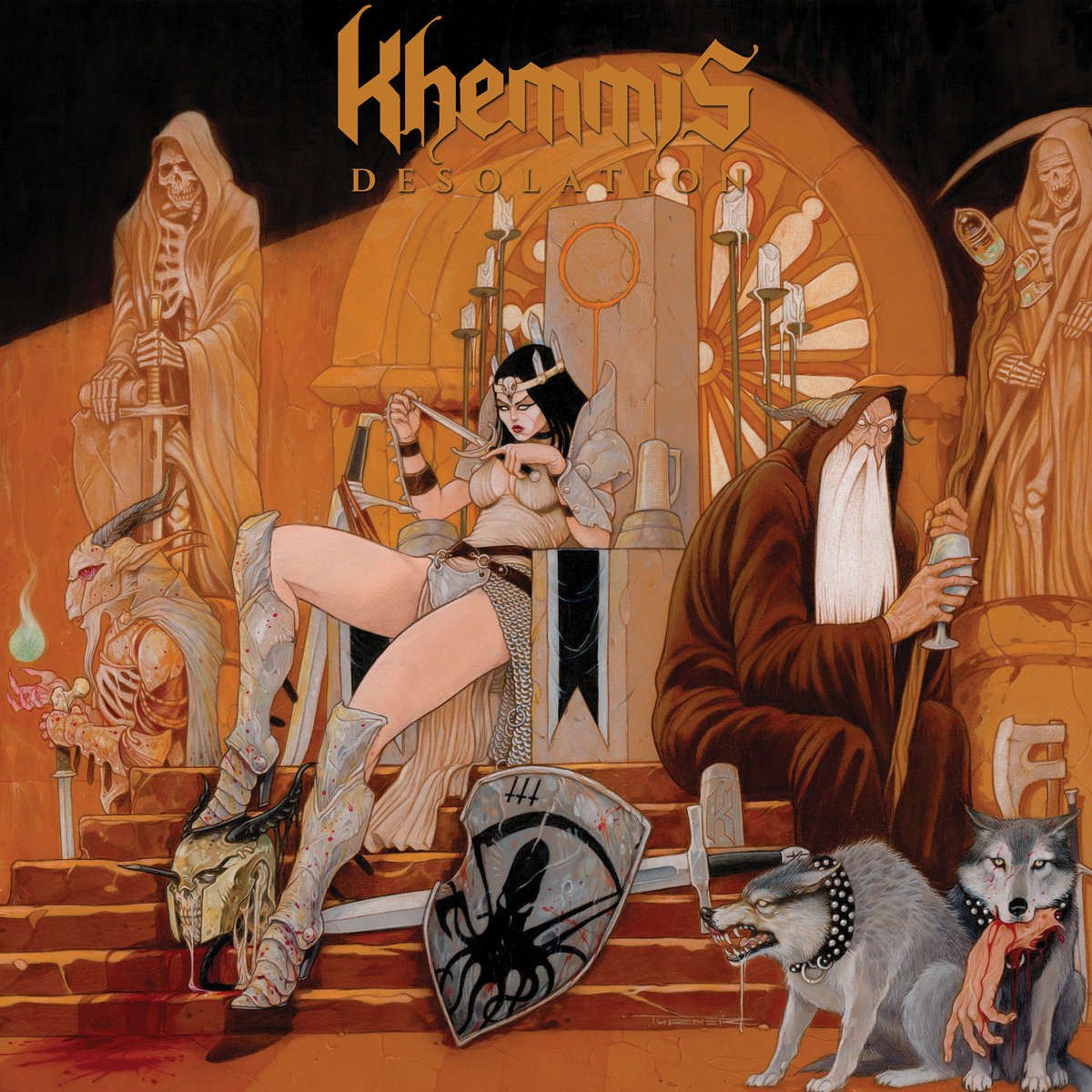Strength to Carry On: An interview with Khemmis

Denver, Colorado’s Khemmis know their history. They’re a relatively young band, having only been playing together for about six years, but in that time they’ve established themselves as one of the most consistently compelling bands in metal, pulling from ’80s-era influences such as Mercyful Fate and Iron Maiden while carving out a unique niche among an increasingly blurred field of contemporary heavy music. And with their new album Desolation, they find an even more nuanced balance of the ’80s stadium-metal hooks, contemporary songwriting nuances and “evil” that have always been a part of their musical DNA.
With Desolation, there’s a sense of unrest underpinning their songs. In the first line of the album, vocalist Phil Pendergast asks, bluntly, “Have we gone blind?” It’s perhaps not an explicitly political work, but it speaks to a growing sense of doom in the world, one that Khemmis acknowledges readily. Even in the album’s catchiest song, “Isolation,” there’s a sense of defeat that’s palpable: “I’m dreaming of your call that will never come/Holding on by a thread.” There’s torment and feelings of hopelessness, but hope itself is not altogether absent. “From Ruin” closes the album with a moment of optimism, or at least stubborn defiance: “I find the strength to carry on.” There’s a very human, very relatable and emotional core of what Khemmis does, even at their most badass and escapist.
We spoke to guitarist and vocalist Ben Hutcherson about finding solace in music, seeking out an evil sound and counteracting the real darkness in the world.
When you were working on Desolation, what sort of themes were you looking to explore?
In just the sort of trajectory of our lives over the last few years, we arrived at a place of being more frustrated, having a sense of despondency, disconnectedness from the world around us, from the idea of being human sometimes. Starting from where we were meant we were starting from a little bit darker place. Not that we were thinking this album should sound more quote-unquote evil, but sort of psychological place…made the more evil musical influences—the black metal, the more old-school evil sounding heavy metal, Mercyful Fate, King Diamond, those bands and albums were resonating with us in a more intense way they had in the years when we were working on the other albums. We wanted to really push ourselves to write songs that had choruses that really stuck in your head, and writing vocals and melody lines to really kick it up one or two or ten notches. To give the most compelling performances we possibly could. By having that mindset it meant certain sounds and approaches—especially the more extreme influences, felt more natural to manifest in a more obvious way than on previous records.
You mention a disconnect from the world around us—it’s hard not to hear echoes of the state of the world in some of the more pessimistic songs on the record.
Yeah, you’re absolutely right. It’s an intersection of hard experiences with the pains that we’ve been going through as individuals, loss of loved ones, getting older, coming face to face with mortality in the last couple years. And the way that sort of intersects with all the shit around us and how it feels like everything is burning. Or maybe it needs to be burning, I’m not entirely sure. The songwriting processes for the previous albums, maybe one or two of us would be going through some heavier stuff, the world around us might have offered some comfort or stability, and it had felt or continues to feel that our individual lives or personal lives are the only things we can make sense of because the rest of the world is going to shit. I mean, it’s been going to shit for a long time, but it’s just been kicked up to 11 in the last couple years. When you think about the lyrics on Desolation and the mood we tried to strike with our notes, it really does get to that overwhelming sense of, not that it’s time to give up but that there are fewer choices. Like, what the fuck are we supposed to do with all this? And that means, for us, to try to channel that through music and is cathartic for us, and hopefully is cathartic for everyone else. Because otherwise that just builds up inside you and turns to cancer when you’re 50.
I can’t help but hear a sense of hope in the album’s closing track, “From Ruin.” Is it important for you to balance that out against some of the pessimism you’ve expressed?
Yeah, it is, because it’s easier to get wrapped up in your own jaded cynicism and easy to forget there are ways that tomorrow can be better. Not in some hippy dippy “tomorrow will be beautiful” kind of thing. But it’s so easy to get mired in the bleakness of it all, that one of the things we have work to to, not only as a band but as four guys, four friends, is to be present and take stock of what we have. Even when the world’s on fire, there’s still good stuff around us. There’s still love and compassion in our lives, with our spouses and our children and in my case, my dogs. We’re really fortunate to be part of this creative moment in Denver where music and particularly heavy music is just on fire. Even socio-politically, when it feels overwhelming and there’s no way forward, there’s so much good stuff happening if you can let yourself hold on to that. Things can be bad and things can be dark and you can be overwhelmed, but that’s a natural progression of life as a human being, but in order to end up somewhere healthier and more positive where you can make some kind of meaningful contribution to the world, you have to pay attention to those good moments. You have to force yourself to look forward so you don’t just focus on the past or even the present and think of ways the future can be brighter and filled with moments of joy, however fleeting.

Does playing music give you a sense of release or is it therapeutic in some way?
Oh my god, I don’t know what I’d do. Actually I do know what I’d do: I’d be overweight and drinking too much and be a miserable sack of shit. It’s important to have some way to channel—both negative and positive energies into something. Whether it’s objectively productive on a large scale it’s productive for the individual, and less than just exorcising demons and getting in the right head space. And I know for me and the rest of the guys in Khemmis, a version of the world where I’m not playing music is not a world where I’m doing particularly well. Aside from individual self care, there are people in other parts of the world I’ll probably never meet, who find solace in our music and a sense of being connected to other people, so not only is this a long-term project just keeping the psychological and emotional poisons out of the body, it’s also about not being hyper focused on my individual bullshit and being reminded that by trying to do something that is genuine and honest and creative, there’s a chance it’ll speak to other people and I think that’s an important contribution to the world—giving other people a sense of hope, especially if you’re struggling yourself, to know you give someone else a moment of peace, who wouldn’t want that?
There’s been a greater visibility for Khemmis since Hunted, especially a critical response. Has that resulted in any major changes for the band since it began?
We never set out to do any one thing with this band other than write music we find fun. Because we never started this out with dreams of riches and heavy metal stardom or anything like that. We just needed a creative outlet and wanted to do something that felt real and we were proud of. To see that land with people outside of Denver in a meaningful way—when you get an email or Facebook message from a fan somewhere gushing about how much they love the band, that experience continues to be something we hold on to. The first time I remember something like that happened was when we played Denver Black Sky in 2014, this guy came up to the merch booth and this guy was stationed overseas in Afghanistan, and he said the music helped him get re-acclimated to being a music not in a warzone. That was amazing. That was overwhelming. It makes me feel like I’m helping to make the world less shitty, even if it’s incrementally so.

